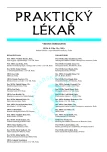Transparent accountability in medicine and responsibility of ethics committees.
Authors:
L. Zamykalová; J. Šimek
Authors‘ workplace:
Vedoucí: doc. MUDr. Jiří Šimek, CSc.
; Jihočeská univerzita v Českých Budějovicích
; Zdravotně sociální fakulta
; Katedra filozofie a etiky v pomáhajících profesích
Published in:
Prakt. Lék. 2008; 88(2): 67-70
Category:
Editorial
Overview
This paper is a reflection on the meaning of the term “accountability”, which is connected with the concepts of responsibility, trust and transparency. The authors present certain situations in pharmacology research that require responsibility of actions in conjunction with transparency of decision making. Various forms of conflicts of interest in financing the development of new drugs are discussed, including the risks connected with them and the problem of objectivity in decision making.
Key words:
Accountability; research ethics; ethics committees.
Sources
1. Abraham, J., Davis, C. Risking public safety: Experts, the medical profession and ‘acceptable‘ drug injury. Health, Risk & Society 2005, 7, 4, p. 379-395.
2. Berg, M., Timmermans, S. The gold standard. The challenge of evidence-based medicine and standardization in health care.: Philadelphia: Temple University Press, 2003.
3. Bodewitz, J.H.W., Buruma, H., de Vries, G.H. Regulatory science and the social management of trust in medicine. In: W. Bijker, T. P. Hughes, T. Pinch eds.: The social construction of technological system. London: The MIT Press, 1991, p. 243-260.
4. Brown, N. Hope against hype – accountability in biopasts, presents and futures. Science Studies 2003, 16, 2, p. 3-21.
5. De Vries, R.G., Bosk, C.L. The bioethics of business: Rethinking the relationship between bioethics consultants and corporate clients. Hastings Center Report 2004, 34, 5, p. 28-32.
6. Hedgecoe, A. It’s money that matters: The financial context of ethical decision-making in modern biomedicine. Sociology of Health & Illness 2006, 28, 6, p. 768-784.
7. Hendriks, R., Bal, R., Bijker, W.E. Beyond the species barier: The Health Council of The Netherlands, legitimacy, and the making of objectivity. Social Epistemology 2004, 18, 2-3, p. 271-299.
8. Jallinoja, P. Ethics of clinical genetics: The spirit of the profession and trials of suitability from 1970 to 2000. Critical Public Health 2002, 12, 2. p. 103-118.
9. Konopásek, Z. et al. Czech Republic - a national profile. Research report of the Public Accountability European Research Project, CT2001-00076. Praha, 2002. Dostupné na http://www.cts.cuni.cz/ ~pa/docs/WP1_Czech.pdf
10. Porter, TM. Trust in numbers: Objectivity in science and public life. Princeton: Princeton University Press, 1995.
11. Wiener, C.L. The elusive quest: Accountability in hospitals. New York: Aldine de Gruyter, 2000.
Labels
General practitioner for children and adolescents General practitioner for adultsArticle was published in
General Practitioner

2008 Issue 2
- Advances in the Treatment of Myasthenia Gravis on the Horizon
- Hope Awakens with Early Diagnosis of Parkinson's Disease Based on Skin Odor
- Memantine in Dementia Therapy – Current Findings and Possible Future Applications
- Memantine Eases Daily Life for Patients and Caregivers
- Possibilities of Using Metamizole in the Treatment of Acute Primary Headaches
-
All articles in this issue
- Transparent accountability in medicine and responsibility of ethics committees.
- Current possibilities and problems of antiretroviral therapy
- Insights into the pathogenesis of autism spectrum disorders from the molecular and cellular level
- Memory and its disturbances
- Metallothionein and its relation to anticancer treatment by platinum complexes
- Left atrial structural remodelling and restoration of atrial contraction after successful thoracoscopic epicardial microwave pulmonary vein isolation.
- The hoarding of possessions and animals
- Current strategy to pneumococcal conjugate vaccine immunization
- Acute toxic hepatitis following consumption of a herbal preparation
- General Practitioner
- Journal archive
- Current issue
- About the journal
Most read in this issue
- Memory and its disturbances
- Current possibilities and problems of antiretroviral therapy
- The hoarding of possessions and animals
- Acute toxic hepatitis following consumption of a herbal preparation
